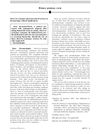 150 citations,
February 2008 in “The Journal of clinical endocrinology and metabolism/Journal of clinical endocrinology & metabolism”
150 citations,
February 2008 in “The Journal of clinical endocrinology and metabolism/Journal of clinical endocrinology & metabolism” Antiandrogens are somewhat effective in reducing excessive hair growth in women.
 January 2008 in “Dermatology Online Journal”
January 2008 in “Dermatology Online Journal” Hormonal therapy like cyproterone acetate and spironolactone may help female hair loss, but more research is needed, especially for pre-menopausal women.
 34 citations,
February 1992 in “The Journal of Clinical Endocrinology and Metabolism”
34 citations,
February 1992 in “The Journal of Clinical Endocrinology and Metabolism” Finasteride and minoxidil together promote hair growth better than either alone.
 467 citations,
October 2014 in “European Journal of Endocrinology”
467 citations,
October 2014 in “European Journal of Endocrinology” The European Society of Endocrinology advises individualized long-term management for PCOS, focusing on lifestyle changes, accurate diagnosis, and treatments for associated health risks and symptoms.
 9 citations,
October 2020 in “Journal of The American Academy of Dermatology”
9 citations,
October 2020 in “Journal of The American Academy of Dermatology” Low-dose oral minoxidil is an effective and well-tolerated treatment for hair growth in alopecia patients.
 2 citations,
June 2000 in “Journal of Oral and Maxillofacial Surgery”
2 citations,
June 2000 in “Journal of Oral and Maxillofacial Surgery” Hair transplantation techniques have improved over time, leading to natural-looking results and high graft survival rates, making it a popular treatment for hair loss.
 22 citations,
October 2020 in “Anais Brasileiros de Dermatologia”
22 citations,
October 2020 in “Anais Brasileiros de Dermatologia” The Brazilian Society of Dermatology agrees that oral isotretinoin is effective for acne and other skin conditions, and it's safe when monitored, but more research is needed on dosing and duration.
 14 citations,
October 2020 in “Natural Products and Bioprospecting”
14 citations,
October 2020 in “Natural Products and Bioprospecting” Various treatments, including FDA-approved drugs, natural products, and oral supplements, can help with hair loss, but a patient's medical history and potential allergies should be considered when choosing a treatment.
 13 citations,
February 2018 in “Dermatologic Therapy”
13 citations,
February 2018 in “Dermatologic Therapy” Finasteride 2.5 mg/day can effectively treat female hair loss.
 January 2007 in “Yearbook of Dermatology and Dermatologic Surgery”
January 2007 in “Yearbook of Dermatology and Dermatologic Surgery” Intramuscular triamcinolone and pulse therapy with oral predonine are effective for alopecia areata with manageable side effects, but better relapse prevention is needed.
 October 2023 in “Journal of the American Academy of Dermatology”
October 2023 in “Journal of the American Academy of Dermatology” Clascoterone cream could be used for other skin conditions affected by hormones.
 83 citations,
April 1992 in “Clinical Endocrinology”
83 citations,
April 1992 in “Clinical Endocrinology” Having enough iron improves the effectiveness of a specific hair loss treatment in women.
 13 citations,
March 2011 in “British Journal of Dermatology”
13 citations,
March 2011 in “British Journal of Dermatology” A woman with scalp lymphoma and hair loss improved with radiotherapy, highlighting the need for biopsies in similar cases.
 November 2023 in “JAAD case reports”
November 2023 in “JAAD case reports” Exogenous testosterone use may be linked to developing hidradenitis suppurativa.
 January 2024 in “The Journal of Dermatology”
January 2024 in “The Journal of Dermatology” Taking finasteride every other month can still help with hair loss but may be less effective over time compared to taking it daily.
 January 2024 in “Journal of Biosciences and Medicines”
January 2024 in “Journal of Biosciences and Medicines” Future treatments for androgenic alopecia may focus on reactivating hair follicle stem cells and improving drug delivery.
 December 2015 in “Dermatologic Therapy”
December 2015 in “Dermatologic Therapy” Zinc sulfate solution is more effective than tea lotion for treating acne rosacea.
9 citations,
February 2007 in “JAMA” PCOS is a common inherited condition causing cysts, irregular periods, and increased diabetes risk in women.
 July 2024 in “Journal of Pediatric Endocrinology and Metabolism”
July 2024 in “Journal of Pediatric Endocrinology and Metabolism” Ovarian hyperthecosis should be considered in young women with severe male-like symptoms and can be managed with hormone treatments.
 February 2024 in “Skin Research and Technology”
February 2024 in “Skin Research and Technology” Microneedle therapy combined with serum effectively increases hair count in people with hair loss, with no side effects.
 February 2024 in “PloS one”
February 2024 in “PloS one” Tofacitinib and adalimumab are promising treatments for cicatricial alopecia with few side effects.
6 citations,
August 2012 in “PubMed” Finasteride may effectively treat female pattern hair loss.
 5 citations,
February 2021 in “Journal of The American Academy of Dermatology”
5 citations,
February 2021 in “Journal of The American Academy of Dermatology” Online skin care companies offer easy access to treatments but may have ethical issues like confirming patient identity, prescribing unproven therapies, and not fully explaining medication side effects. They should prioritize patient care over profit.
 22 citations,
January 2015 in “Dermatology Research and Practice”
22 citations,
January 2015 in “Dermatology Research and Practice” An extra-strength marine protein supplement helped increase hair growth and decrease hair shedding in women with thinning hair.
 24 citations,
January 2015 in “Evidence-based Complementary and Alternative Medicine”
24 citations,
January 2015 in “Evidence-based Complementary and Alternative Medicine” Polygonum multiflorum can promote hair growth when taken orally or applied topically.
 July 2017 in “Clin-Alert”
July 2017 in “Clin-Alert” Different medications can cause serious side effects in some people.
 February 1990 in “Journal of The American Academy of Dermatology”
February 1990 in “Journal of The American Academy of Dermatology” New skin treatments in 1987-1988 showed effectiveness for various conditions, but some had side effects or risks.
 1 citations,
July 2017 in “Clinical research in dermatology”
1 citations,
July 2017 in “Clinical research in dermatology” Hair loss, known as Androgenetic Alopecia, is often caused by hormones and can be diagnosed using noninvasive techniques. Treatments include topical minoxidil and oral finasteride, with new treatments being explored. There may also be a link between this type of hair loss and heart disease risk.
 July 2003 in “Journal of Cutaneous Medicine and Surgery”
July 2003 in “Journal of Cutaneous Medicine and Surgery” Certain drugs can cause lupus, stopping these drugs is the main treatment. NB-UVB phototherapy clears psoriasis faster when applied three times a week. Monoclonal antibodies and oral pimecrolimus are effective in treating psoriasis. Smoking and drinking are linked to psoriasis in men. No direct link between low iron and hair loss was found. Vaccines are effective against genital herpes and human papillomavirus type 16.



























